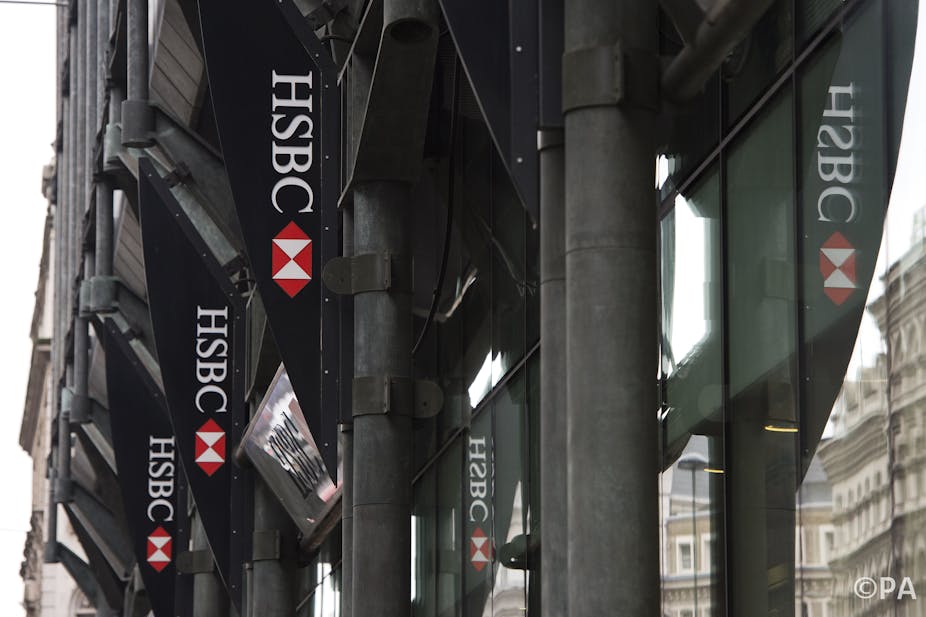Without going over the depressing details again, a series of past and present managers and board members at HSBC have claimed that they don’t know what all their employees actually do. Given the salaries of those crying crocodile tears, and the huge level of tax avoidance their organisation has encouraged, it’s not surprising that they have faced incredulous hostility.
Margaret Hodge, chair of the Public Accounts Committee, has been groaning and raising her eyebrows.
But what if they actually don’t know?
HSBC has around 6,600 offices in 80 countries and around quarter of a million employees. Just think about that for a minute. Imagine that everyone in Stoke-on-Trent was employed by the same company. Then imagine all those people dispersed around the world, working in different languages, legal systems, employment practices and cultures. Is it really practical to imagine that anyone at the top could know what all these people are doing?

Small is beautiful
It seems to me that one of the issues that lurks behind the carnival of banking scandals is scale. When chief executives express their insistence on changing the culture of their organisation, and blame some bad apples for what they perceive has gone wrong, we should really be asking some different questions. If banks were smaller, would they be easier to manage? Would they be easier for us to manage?
In 1973, Ernst Schumacher published his iconic collection of essays: Small is Beautiful. His key argument is that “giganticism” – of whatever form – is a problem, and that we need to organise economies on a human scale.
The argument obviously applies to organisations too. We are confronted now by businesses which are colossal – the size of small countries – and which operate globally. Walmart employs 2.1m people. Foxconn, which makes Apple products, employs 1.2m. Tesco employs nearly 600,000 staff.
Responsibility
Large organisations like to talk about corporate social responsibility, but what does responsibility mean at that sort of scale? When we tiny humans talk about responsibility, we might refer to our families, to friends and neighbours, to people whose faces we know and whose trust we hold. For people, responsibility is a small thing, something felt in the body as we worry about letting people down, or smile when we remember someone’s thank you for something that we did.
But how can a corporation of a quarter of a million feel responsibilities – and if it operates in 80 countries, then who is it responsible to? At the Public Accounts Committee, the CEO of HSBC, Stuart Gulliver, the former CEO of global private banking, Chris Meares, and Rona Fairhead, an independent non-executive director, all claimed that they didn’t know – much to Hodge’s disdain.
But it’s hardly surprising really, given the scale of the responsibilities that they are being paid to take on. And the “heads must roll” incantation simply offers more well-compensated sacrifices to the behemoth and does nothing to actually address the underlying problem.
A radical suggestion
This isn’t to suggest that Hodge is wrong – and that she should let evidence of corruption and stupidity pass unremarked. But I would also like to see discussion of some much more radical suggestions for dealing with banks – and all big organisations.
For a start, there seems to me to be no good reason not to break up organisations into manageable chunks, and probably to insist that these parts should only operate within one tax jurisdiction. This would go along with another simple step, which would be to say that no company can hold shares in another company. That way, size will become a pathology; an evasion of responsibility, rather than an excuse to build a bigger skyscraper.
This might sound terribly radical – and no doubt the apologists for huge corporations will explain why efficiencies of scope and scale are achieved through size. But we can list on the other side of the scale all the problems of giganticism – including tax avoidance, a race to the bottom for wages and worker’s rights, sickening salaries for chief executives, and so on.
After all, if HSBC’s top dogs – Gulliver, Meares, Fairhead et al – don’t know what’s going on, then how the hell can the rest of us? Too big to fail clearly also means too big to manage.

